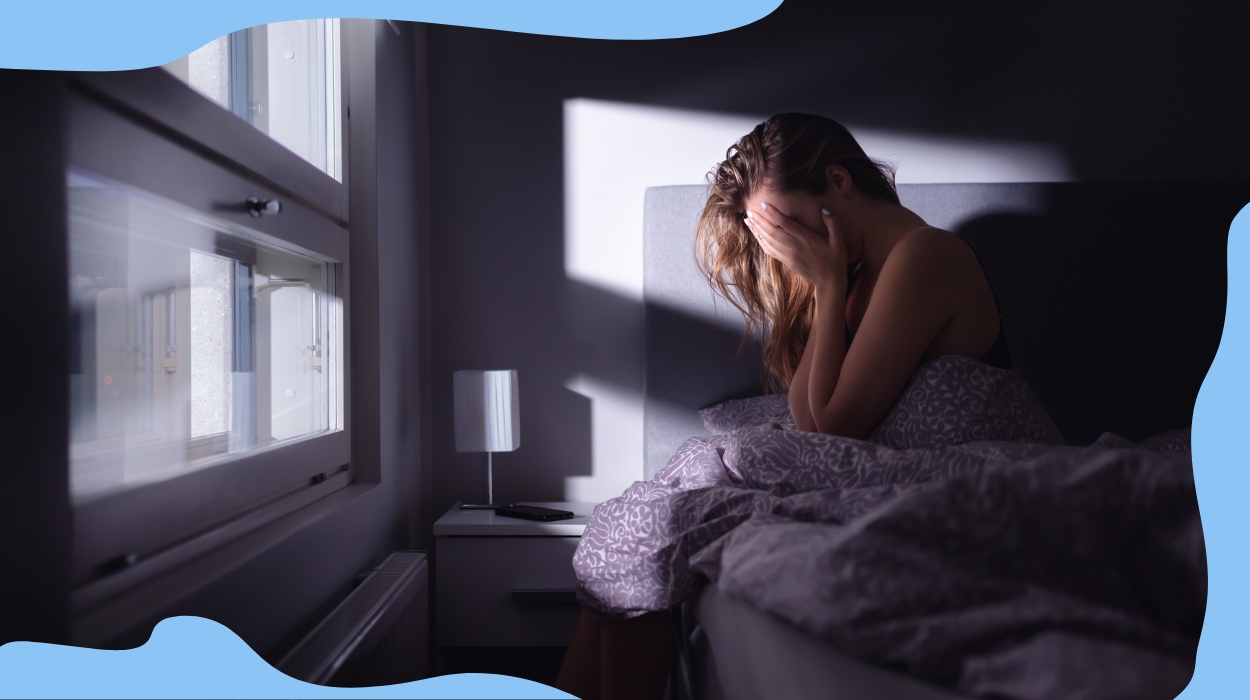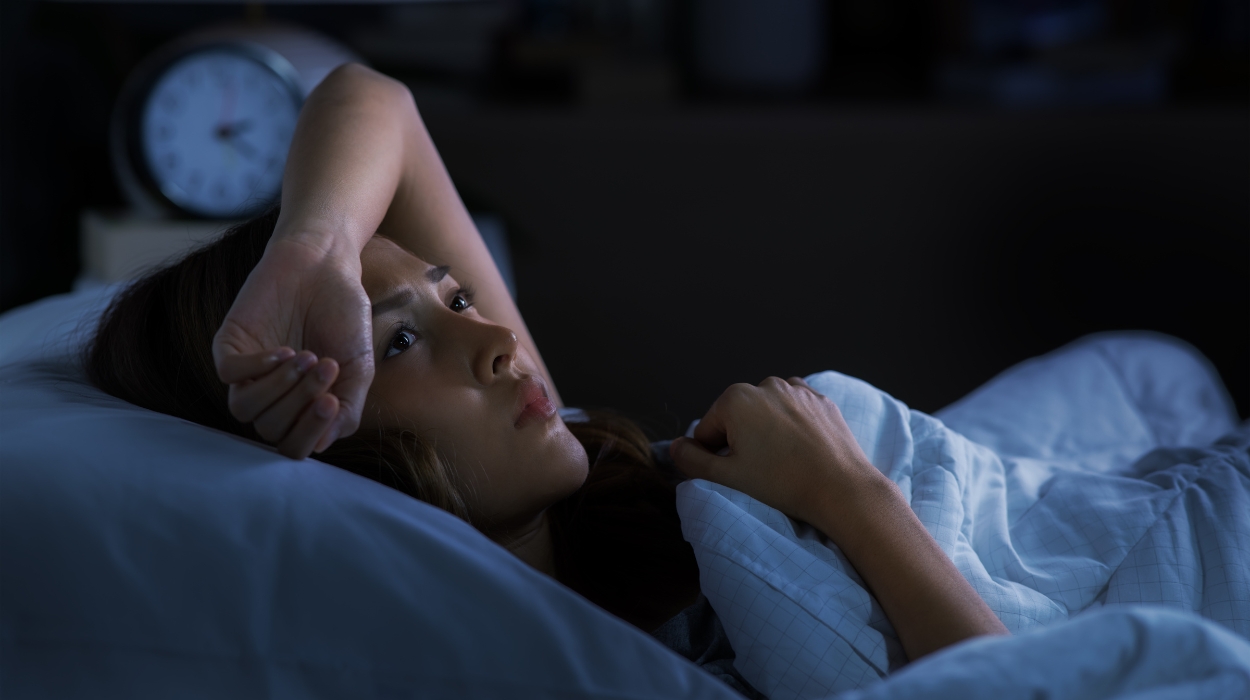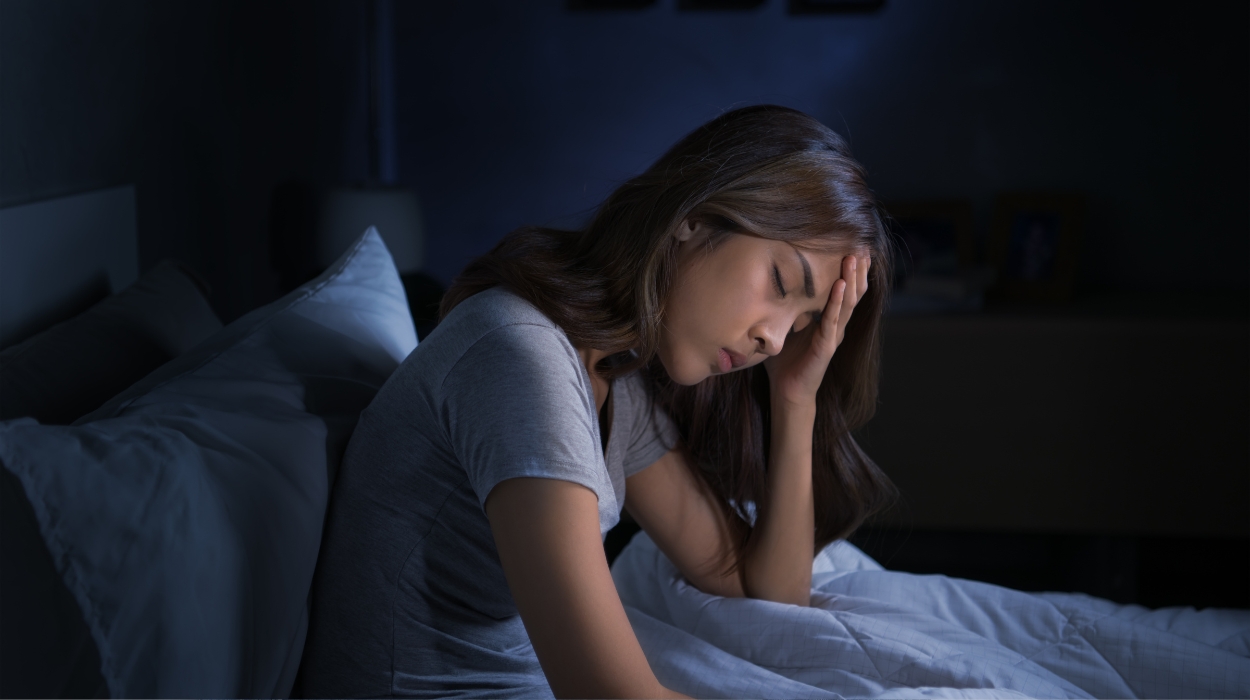 Evidence Based
Evidence Based
Evidence Based
This article is objectively based on relevant scientific literature, written by experienced medical writers, and fact-checked by a team of degreed medical experts.
Our team of registered dietitian nutritionists and licensed medical professionals seek to remain objective and unbiased while preserving the integrity of any scientific debate.
The articles contain evidence-based references from approved scientific sites. The numbers* in parentheses (*1,2,3) will take you to clickable links to our reputable sources.
Anxiety When Falling Asleep: What Is It & How To Overcome It?

Dealing with anxiety at night can transform a peaceful slumber into a nightly battle, which is especially frustrating when you’re just trying to fall asleep. This isn’t about occasional restlessness, but an anxiety disorder that flares up at night, leading to nocturnal panic attacks and sleep disorders.
If this sounds like you, you’re not alone. More people are seeking tips on how to sleep better and cope with nighttime anxiety. This article explores the causes and symptoms of this anxiety, its effects on sleep, treatments, and practical tips for a calm sleep routine.
Whether you’re considering therapy or using CBD oil for sleep, our aim is to help you better manage nighttime anxiety and secure a good night’s rest.
What Is Anxiety When Falling Asleep & What Does It Feel Like?
Sleep anxiety often feels like a sense of dread or unease about going to sleep. Physical symptoms may include rapid heartbeat, restlessness, difficulty breathing, and excessive sweating. It can also cause difficulty falling asleep and frequent awakenings.
Symptoms Of Anxiety Before Sleep
Physical Symptoms: What Does Your Body Experience?
Anxiety before sleep manifests in various physical symptoms, making it a distressing experience for those affected. These symptoms can include (but aren’t limited to):
- Rapid heart rate.
- Sweating.
- Trembling.
- Shortness of breath.
- Headaches.
- Muscle tension.
- Gastrointestinal problems.
Emotional Symptoms: How Does It Affect Your Mind?
The emotional impact of anxiety before sleep is also significant. Excessive worry, a sense of restlessness, and a constant feeling of being on edge are common. There may also be a pervasive sense of impending doom and difficulty in focusing or concentrating, all of which can make the process of falling asleep extremely challenging.
Daytime Symptoms
Experiencing anxiety at night can also lead to a series of daytime symptoms, most of them due to poor sleep quality. Common ones include excessive daytime fatigue, sleepiness, irritability, mood swings, and difficulties focusing on tasks or remembering things. These symptoms can significantly impact day-to-day life, further emphasizing the need to manage and address anxiety before sleep.
Anxiety And Falling Asleep

Anxiety Disorders & Sleep – Relationship Status: Complicated
Anxiety disorders and sleep have a complex, intertwined relationship. It’s a cycle: anxiety negatively affects sleep; In turn, lack of sleep can make anxiety worse. This can include sleep anxiety or nocturnal and daytime panic.
This symbiosis can be particularly problematic when you’re trying to fall asleep. The quiet solitude of night can leave room for anxious thoughts to take over, making it harder to drift into a peaceful slumber.
Statistics On Sleep-Related Anxiety Disorders
Recent research[1] suggests that sleep-related anxiety disorders are more common than previously thought. Approximately 50-70 million US adults suffer from a sleep disorder, with insomnia often linked to anxiety being the most common. An estimated 35-50% of adults experience occasional insomnia, while 5-15% report chronic insomnia.
Prevalence Of Nocturnal Panic Attacks
Nocturnal panic attacks,[2] a particular form of anxiety disorder that strikes when a person is in the deepest stages of sleep, also appear to be widespread. These nighttime episodes affect around 50-70% of people with panic disorder,[3] a mental health condition marked by frequent panic attacks.
The Impact On Economics & Public Health
Sleep-related anxiety disorders and their effects go beyond individual health. They have broader implications for public health and the economy.
Individuals with these disorders often experience excessive daytime fatigue, leading to decreased productivity[4] at work and a higher risk of accidents. This can cost the economy billions of dollars annually in healthcare costs and lost productivity.
On a public health level, chronic sleep deprivation is linked to serious medical conditions, including high blood pressure and heart disease.
Causes Of Anxiety Before Sleep
How Sleep Affects An Existing Anxiety Disorder
Sleep and anxiety have a cyclical relationship, with each one potentially exacerbating the other. An existing anxiety disorder can make it harder for you to fall asleep or stay asleep through the night. Anxious thoughts can become amplified in the quiet hours of the night, leading to increased nervousness at bedtime.
In those with anxiety disorders, the stress hormone cortisol often remains high at night, preventing the body from fully relaxing and falling asleep easily. This creates a vicious cycle.
Medical Conditions That Can Trigger Nocturnal Panic Attacks
Beyond the direct effects of an existing anxiety disorder, several medical conditions[5] can also mimic or trigger nocturnal panic attacks. The following are just a few examples:
- Sleep apnea (SA or OSA): Characterized by periodic breathing disruptions during sleep, sleep apnea can lead to panic attacks.
- Restless leg syndrome (RLS): Marked by an irresistible urge to move the legs at rest, RLS can increase anxiety[6] levels and disrupt sleep.
- Hypertension and heart disease: Certain cardiovascular conditions can cause symptoms similar to panic attacks, thereby increasing nocturnal anxiety.
How Does Anxiety Affect Sleep?

Sleep Quality
Anxiety can have a significant impact[7] on the quality of your sleep. With a racing mind and heightened state of alertness, falling asleep can be a struggle, leading to prolonged periods of wakefulness or insomnia.
Additionally, anxiety often disrupts the sleep cycle, interrupting the deeper stages of sleep when the body undergoes restorative processes. As a result, even if individuals with anxiety manage to get some sleep, they often wake up feeling unrefreshed and fatigued.
Dream Patterns
Anxiety also influences our dream patterns.[8] People with anxiety disorders often experience more vivid and emotionally intense dreams, typically with negative or fearful content. This is often related to anxiety increasing arousal and activation in the brain, which can carry over into dream content. In some cases, this might even escalate to nightmares or night terrors.
Social & Behavioral Challenges
The combination of poor sleep quality and anxiety-driven dreams can lead to a variety of social and behavioral challenges. Daytime fatigue and irritability can strain relationships and impair performance at work or school. Additionally, the fear of experiencing anxiety or nightmares can lead to sleep avoidance, creating a vicious cycle of sleep deprivation and heightened anxiety.
Treatments For Anxiety
Medical Interventions
Selective serotonin reuptake inhibitors (SSRIs) and serotonin and norepinephrine reuptake inhibitors (SNRIs) are two different classes of antidepressants. They are commonly used to treat both anxiety and insomnia.[9]
Benzodiazepines[10] can provide short-term relief for acute symptoms of anxiety.
For some people, other medication types like beta-blockers[11] or atypical antipsychotics may be useful.
Behavioral Therapies
Cognitive Behavioral Therapy[12] (CBT) is one of the most effective treatments for anxiety disorders, teaching individuals to identify and challenge their thought patterns.
Techniques such as deep breathing, progressive muscle relaxation, and meditation can help manage anxiety symptoms.
Lifestyle changes, like regular physical activity, a balanced diet, and good sleep hygiene, can also significantly manage anxiety.
7 Tips For Falling Asleep With Anxiety
- Establish a consistent sleep schedule: Try to go to bed and wake up at the same time every day, even on weekends.
- Create a relaxing bedtime routine: This could include activities like reading, taking a warm bath, listening to calming music, or practicing deep breathing exercises.
- Limit caffeine and alcohol: Especially in the 6 hours before you sleep. Both substances can disrupt your sleep patterns and increase anxiety.
- Create a comfortable sleep environment: Ensure your bedroom is cool, quiet, and dark. Consider using a sleep mask or earplugs if necessary.
- Stay active: Regular physical activity can help reduce anxiety and improve sleep quality.
- Consider natural sleep aids: Some individuals find relief by using CBD oil for sleep. Always consult your doctor before trying new sleep aids.
- Limit bedtime screen time: Whether it’s at bedtime or the middle of the night, screens of every size can disturb your sleep. And this is before we consider how anxiety-inducing the content is.
Conclusion
Experiencing anxiety when falling asleep is a widespread issue that can significantly affect one’s quality of life. However, understanding the connection between anxiety and sleep, recognizing the symptoms, and learning how to manage anxiety can greatly improve sleep quality.
By seeking appropriate treatments and incorporating the mentioned tips into your lifestyle, you can overcome this form of anxiety and enjoy a better night’s rest.
Remember, reaching out to professionals is okay! There’s always help available. Don’t let anxiety steal your sweet dreams!
Frequently Asked Questions
Anxiety when falling asleep can be triggered by various factors, including stress, lifestyle habits, or an underlying mental health disorder. As your body calms down for sleep, you may become more aware of your thoughts, which can cause anxiety.
Calming anxiety can involve strategies such as deep breathing exercises, progressive muscle relaxation, maintaining a regular sleep schedule, practicing good sleep hygiene, and creating a relaxing nighttime routine. Consultation with a mental health professional may be beneficial.
Research suggests that nearly half of the population experiences some form of sleep trouble, with anxiety being a significant contributing factor. Conditions like generalized anxiety disorder, bipolar disorder, and panic disorder have high comorbidity with sleep disorders.[13]
If it feels like you’re forgetting to breathe as you fall asleep, it may be due to hyperventilation related to anxiety or a condition known as obstructive sleep apnea. Consult with a healthcare provider for proper diagnosis and treatment.
There is evidence that CBD can help with both anxiety and sleep. You can learn more about available products by exploring resources such as these CBDfx reviews. Always consult with your healthcare provider before starting a new supplement.
+ 13 sources
Health Canal avoids using tertiary references. We have strict sourcing guidelines and rely on peer-reviewed studies, academic researches from medical associations and institutions. To ensure the accuracy of articles in Health Canal, you can read more about the editorial process here
- Edinger, J.D., J. Todd Arnedt, Bertisch, S.M., Carney, C.E., Harrington, J.A., Lichstein, K.L., Sateia, M.J., Troxel, W.M., Zhou, E.S., Kazmi, U., Heald, J.L. and Martin, J.H. (2021). Behavioral and psychological treatments for chronic insomnia disorder in adults: an American Academy of Sleep Medicine systematic review, meta-analysis, and GRADE assessment. [online] 17(2), pp.263–298. doi:https://doi.org/10.5664/jcsm.8988.
- Nakamura, M., Sugiura, T., Nishida, S., Komada, Y. and Inoue, Y. (2013). Is Nocturnal Panic a Distinct Disease Category? Comparison of Clinical Characteristics among Patients with Primary Nocturnal Panic, Daytime Panic, and Coexistence of Nocturnal and Daytime Panic. [online] 09(05), pp.461–467. doi:https://doi.org/10.5664/jcsm.2666.
- Sahoo Saddichha (2010). Diagnosis and treatment of chronic insomnia. [online] 13(2), pp.94–94. doi:https://doi.org/10.4103/0972-2327.64628.
- Honn, K.A., Torbjörn Åkerstedt and Dawson, D. (2019). Working Time Society consensus statements: Prescriptive rule sets and risk management-based approaches for the management of fatigue-related risk in working time arrangements. [online] 57(2), pp.264–280. doi:https://doi.org/10.2486/indhealth.sw-8.
- Narayana Manjunatha and Ram, D. (2022). Panic disorder in general medical practice- A narrative review. [online] 11(3), pp.861–861. doi:https://doi.org/10.4103/jfmpc.jfmpc_888_21.
- National Institute of Neurological Disorders and Stroke. (2023). Restless Legs Syndrome. [online] Available at: https://www.ninds.nih.gov/health-information/disorders/restless-legs-syndrome.
- Sweetman, A., Lack, L., R. Doug McEvoy, Catcheside, P., Antic, N.A., Ching Li Chai-Coetzer, Douglas, J., O’Grady, A., Dunn, N., Robinson, J., Paul, D. and Smith, S. (2021). Effect of depression, anxiety, and stress symptoms on response to cognitive behavioral therapy for insomnia in patients with comorbid insomnia and sleep apnea: a randomized controlled trial. [online] 17(3), pp.545–554. doi:https://doi.org/10.5664/jcsm.8944.
- Tzioridou, S., Dresler, M., Sandberg, K. and Mueller, E.T. (2022). The role of mindful acceptance and lucid dreaming in nightmare frequency and distress. [online] 12(1). doi:https://doi.org/10.1038/s41598-022-19624-4.
- Everitt, H., Baldwin, D.S., Stuart, B., Gosia Lipinska, Mayers, A., Malizia, A., Manson, C. and Wilson, S. (2018). Antidepressants for insomnia in adults. [online] 2018(5). doi:https://doi.org/10.1002/14651858.cd010753.pub2.
- Breilmann, J., Girlanda, F., Guaiana, G., Corrado Barbui, Cipriani, A., Mariasole Castellazzi, Bighelli, I., Simon, Furukawa, T.A. and Kösters, M. (2019). Benzodiazepines versus placebo for panic disorder in adults. [online] doi:https://doi.org/10.1002/14651858.cd010677.pub2.
- Repova, K., Aziriova, S., Krajcirovicova, K. and Simko, F. (2022). Cardiovascular therapeutics: A new potential for anxiety treatment? [online] 42(3), pp.1202–1245. doi:https://doi.org/10.1002/med.21875.
- Kaczkurkin, A.N. and Foa, E.B. (2015). Cognitive-behavioral therapy for anxiety disorders: an update on the empirical evidence. [online] 17(3), pp.337–346. doi:https://doi.org/10.31887/dcns.2015.17.3/akaczkurkin.
- Merrill, R.M., Ashton, M.K. and Angell, E. (2023). Sleep disorders related to index and comorbid mental disorders and psychotropic drugs. [online] 22(1). doi:https://doi.org/10.1186/s12991-023-00452-3.



